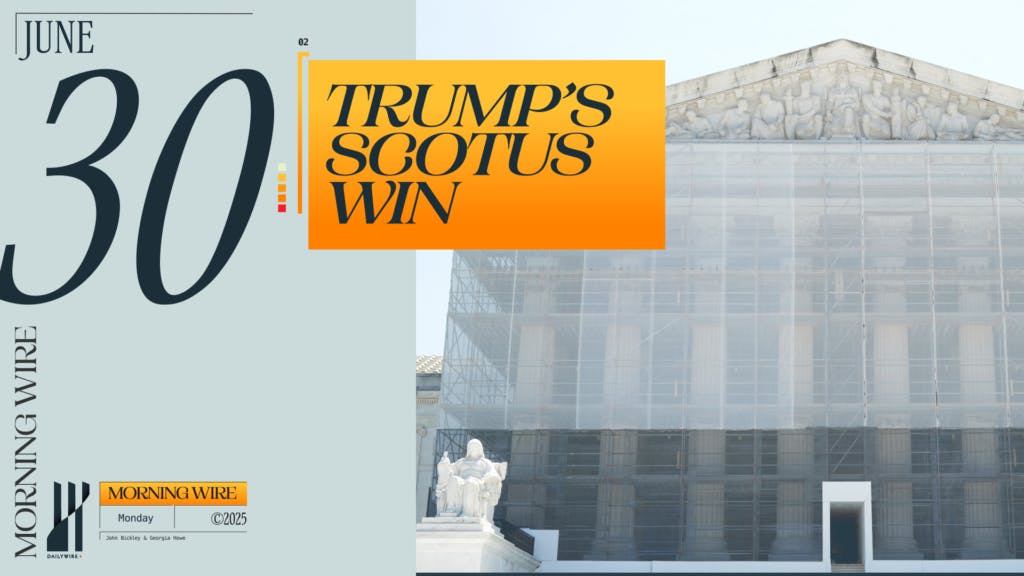The “One Big Beautiful Bill” moves one step closer to the president’s desk, the Supreme Court hands Trump a major victory, and is transgender-mania coming to an end? Get the facts first with Morning Wire.
It’s Monday, June 30, and this is the news you need to know to start your day.
Morning Wire is available on video! You can watch today’s episode here:
If you’d rather listen to your news, today’s edition of the Morning Wire podcast can be heard below:
The ‘Big Beautiful Bill’ Advances Through The Senate

Topline: The “Big Beautiful Bill” clears a key hurdle as President Donald Trump touts a trade deal with China.
The “Big Beautiful Bill” moved one step closer to passage this weekend as Republican lawmakers push the president’s signature legislation to the finish line. This bill includes the bulk of President Trump’s agenda. Among other things, it will make his first-term tax cuts permanent, eliminate taxes on most tips, overtime pay, and Social Security payouts, increase funding for border security, and remove federal benefits from millions of illegal immigrants.
The House passed its version of the bill back in May, but the Senate has been debating it ever since, with serious fractures emerging, as a few moderate and hardline conservatives held out, debating issues such as Medicaid cuts and deficit spending. But after a number of tweaks and amendments, the “Big Beautiful Bill” crossed a major procedural hurdle when the chamber voted 51-49 late Saturday night to advance the bill to the floor for final debates.
JULY 4 SALE: Get Six Months Of DW+ Free
GOP leaders say the goal is to hold a final vote as early as Monday, but Democrats are doing everything in their power to stall the process. For example, Senate Minority Leader Chuck Schumer (D-NY) utilized an obscure Senate rule to require clerks to read the entire 940-page bill aloud on the floor, which delayed proceedings by approximately 15 hours. Democrats will also introduce a number of amendments on issues such as tax cuts for the wealthy and protections for Medicaid and food stamp funding — they know those measures will likely fail, but want to put Republicans on the record ahead of the midterms.
Republicans say Democrats can only stall for so long, and they’re confident the “Big Beautiful Bill” will pass — at which point it’ll return to the House for another final vote, and then make its way to the president’s desk. Trump has requested that it be ready by the 4th of July.
Meanwhile, the Trump administration announced that a deal had been reached with Beijing that would allow Chinese rare earth minerals to once again be exported to the United States in exchange for Washington easing a number of tariffs and other restrictions on the communist nation. While the White House has rushed to open up domestic mines in the United States, this process will take time, and China accounts for approximately 70% of global rare earth mineral production.
By contrast, tariff negotiations with Canada appear to have soured. On Friday, President Trump announced that he had terminated discussions with Canada “effective immediately” after it announced plans for a new digital tax that will cost American tech companies billions of dollars. In a Truth Social post, the president called the new tax a “direct and blatant attack on our Country” and vowed to “let Canada know the Tariff that they will be paying to do business with the United States” in the next week. In response, Canada has imposed new quotas on American steel imports and a 50% tariff on any additional steel entering the country.
SCOTUS Curbs Nationwide Injunctions From Lower Courts

Topline: The Supreme Court issues another landmark ruling on judicial overreach.
Trump vs. Casa, nominally a case about birthright citizenship ultimately centered on the authority of lower federal courts to issue nationwide, or “universal” injunctions, which block the federal government from implementing a policy across the entire country rather than providing narrow relief to the specific plaintiffs of a case. In a 6-3 decision, the Court ruled that, at least in most cases, lower courts do not have the power to issue such injunctions.
That has massive implications for the implementation of President Trump’s agenda; more than 100 universal injunctions have been issued against the Trump administration – including 40 in his second term – and the bulk of those have come from judges appointed by Democrats. Trump has argued that these decisions were politically motivated, that allowing any one of hundreds of federal judges to contradict executive policy violated the constitutional separation of powers, and that activists were deliberately filing cases in districts with left-leaning judges to hamstring his administration. After the ruling, President Trump lauded the “amazing decision,” saying, “This is a very big moment, and it gives power back to people that should have it.”
Casa began as an attempt to challenge Trump’s executive order ending birthright citizenship for the children of illegal aliens. That order is called “Protecting the Meaning and Value of American Citizenship,” and it argues that the Fourteenth Amendment “has always excluded” those who were born in the United States “but not ‘subject to the jurisdiction thereof.’’’ The most relevant precedent, United States v. Wong Kim Ark in 1898, affirmed that the children of immigrants born on American soil are granted birthright citizenship – generally it has been assumed that that precedent applies to the children of illegal aliens as well, although the Supreme Court has not ruled on that definitively and chose not to in Trump vs. Casa.
In the majority opinion, Justice Amy Coney Barrett wrote that “federal courts do not exercise general oversight of the Executive Branch; they resolve cases and controversies consistent with the authority Congress has given them. When a court concludes that the Executive Branch has acted unlawfully, the answer is not for the court to exceed its power, too.”
Title IX Vs Gender Ideology

Topline: The era of transgender-mania might be waning. We have the latest on the debate over women’s sports.
The federal government has become far less accommodating to gender ideology since President Trump took office. Earlier this month, the Trump administration renamed June from “Pride Month” to “Title IX Month” — honoring the civil rights law that prohibits sex discrimination in schools. The president also acknowledged the difference between the sexes with several executive orders when he took office — he barred males in women’s sports at schools, and he prohibited schools from allowing kids to use the bathrooms of the opposite gender.
In a major win for women’s sports advocates, the National Collegiate Athletic Association (NCAA) changed its transgender athlete policy to allow only biological females to compete in women’s sports.
Public discourse on the issue has also undergone significant changes. Earlier this month, Olympic gymnast Simone Biles got into an online altercation with Riley Gaines, the college swimmer who was forced to give up her trophy to trans-identifying male competitor Lia Thomas. Biles attacked Gaines over her work trying to keep men out of women’s sports, and she even insulted her, telling Gaines she looked like a man. In response, Biles faced a tremendous amount of backlash – she ultimately apologized to Gaines before deleting her X account altogether.
Even leftist enclaves are under increasing pressure, from within and without, to protect women’s sports. Last week, Maine’s Democratic Governor Janet Mills, who has fought the Trump administration to keep trans-identifying athletes in women’s sports, was booed by residents of her state when she spoke at the annual Maine Moose Lottery. On Wednesday, the Department of Education stated that it has found California to be in violation of Title IX by allowing males to participate in girls’ sports. Education Secretary Linda McMahon stated that California has 10 days to rectify its violations. This comes after even California Democratic Governor Gavin Newsom admitted on a podcast that males in women’s sports is “deeply unfair.”

.png)
.png)

